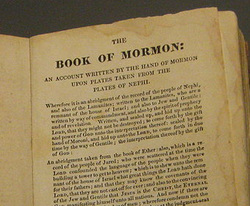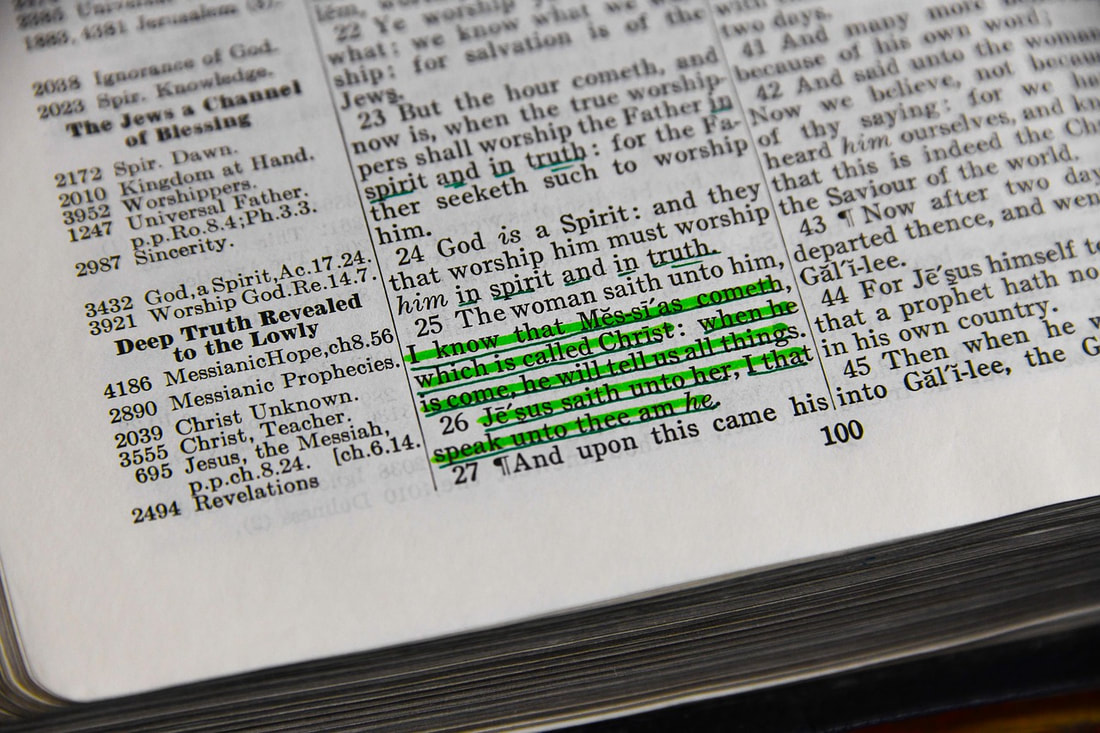|
It's easy to see that the Calvinist's view of Eph. 2:8-9 is wrong when you compare it to Rom. 3:24. The faith of the individual in Eph. 2:8 precedes the application of grace just as the redemption in Rom 3:24 precedes the application of grace in that passage.
0 Comments
What is it that makes an individual a Christian? This simple question has been asked and answered alternatively for nearly two millennia. How one answers this question will have profound implications in his life, his ministry and his future estate. It is imperative that every individual come to a realization of the minimal beliefs with which he must agree in order to obtain salvation.
 I recently spent several days engaged in a facebook debate with a Catholic, and in the process, I was challenged to re-think my view of the relationship between faith and works in James chapter two. Catholic theologians claim that James 2 teaches the necessity of adding good works to our faith in order to obtain final salvation. The typical response to this claim is to argue that James is only speaking of good works as an evidence of our salvation and not as the means of our salvation. The greatest challenge to this argument is found in the use of the word “justified” in verses 21 and 24. Here is my solution to this challenge:
Those given to Jesus by the Father were not the Calvinist elect, but rather they were the ones who had already believed the Old Testament and thus were followers of the Father before they met the Son. The Calvinist that I was debating introduced John 10:26 as an argument against my view of John 6, and I’d like to share my response with you as well.
 I was listening to Dr. James White’s podcast the other day and heard him defending the Calvinist TULIP and criticizing other floral acrostics attempting to provide a contrasting view of salvation. I’ve always disagreed with the doctrines of Calvinism, but I’ve never attempted to organize my disagreement into a simple acrostic which could stand toe-to-toe with the TULIP. That is, I’ve never done so before now. While listening to Dr. White’s podcast, I came up with a simple acrostic that I think defeats the TULIP with ease.  One of the questions that skeptics often ask about the Gospel is “Where are all the prophecies about the Messiah rising from the dead?” This question comes from I Corinthians 15:3-4 where we read: For I delivered unto you first of all that which I also received, how that Christ died for our sins according to the scriptures; And that he was buried, and that he rose again the third day according to the scriptures:  In my last article, I explained why I believe that Mormons are not Christians. After posting that article, I received a response from a young lady named Katie who objected to some of the things that I wrote. Katie's response is available in the comment section of the previous article, but let me copy it here to save you the trouble of clicking the link: I found your blog post to be an interesting read, being a member of the Church of Jesus Christ of Latter Day Saints myself. However, there are some flaws in your argument. First, as a writer, it is untactful to pick and choose from another article rather than do the original research yourself. I highly recommend any of Mcconkie's work, and you should really quote that rather than another article as it is superfluous. It also takes away some of the credit being given to you as a writer. I have written and been published at the high school and the university level if you have more questions on this. Secondly, the doctrine of the Atonement is difficult to grasp in any religion. The mere fact that a man so perfect and so good was willing to endure such pain, misery, loneliness, and criticism for me is unfathomable. The church doctrine is that every one will have eternal life but there are different degrees of glory that everyone can obtain. Jesus died so that everyone may be saved by grace, but those with the knowledge of the truth must also be saved by their actions. Those with the knowledge of Jesus Christ and God the Father are held to a different standard than those who never had the opportunity to receive the truth. How would it be fair to hold them to the same standards simply because they were born in an area that did not have the Gospel? Thirdly, no where in your examples does it explicitly say that Christ did not die for our sins, because he did. Man is not perfect due to the fall of Adam. In order for us to return to Heaven to be with our Heavenly Father, Christ had to atone for the world's sins. This is basic Christian doctrine, and is also basic LDS doctrine. I highly recommend visiting Mormon.org. Not only are these basic questions answered, but you can also ask the missionaries questions and arrange a meeting. In the future, before you discredit a religion entirely, please do actual research, so that others may have the opportunity to discern the truth from false claims for themselves. Thank you, and have a blessed night! I wrote a reply to Katie, but it was far too long to be posted in the comment section, so I decided to post it as today's blog post instead. Here is what I wrote back to Katie:  Over the years, I have heard many reasons given by sincere Christians in an attempt to explain why Mormons are not deserving of that label. Some say that Mormons are not Christians because they do not have an accurate understanding of who God is. Others say that Mormons are not Christians because they do not have an accurate understanding of who Jesus is. Still others claim that a Mormon cannot be a Christian because he does not have an accurate understanding of the Word of God. In essence, these and almost every other reason that I have heard can be stated more simply as: Mormons are not Christians because they do not follow sound doctrine. This seems to be why most Christians reject Mormonism as a false gospel. But let's take a moment to consider the issue in light of Scripture. Does the Bible teach that we obtain salvation by following sound doctrine? Does it teach that one must have an accurate understanding of God, Jesus and the Bible in order to become a Christian? Is it even possible for us as mere mortals to have an accurate understanding of the things of God? The answer to each of these questions is, no. The Bible teaches that there is only one way to become a Christian, and it is not through adherence to a particular set of doctrines. According to the Bible, one becomes a Christian by accepting the truth of the Gospel which is spelled out for us in I Corinthians 15:3-4. |
Bill Fortenberry is a Christian philosopher and historian in Birmingham, AL. Bill's work has been cited in several legal journals, and he has appeared as a guest on shows including The Dr. Gina Show, The Michael Hart Show, and Real Science Radio.
Contact Us if you would like to schedule Bill to speak to your church, group, or club. "Give instruction to a wise man, and he will be yet wiser: teach a just man, and he will increase in learning." (Proverbs 9:9)
Search
Topics
All
Archives
June 2024
|





 RSS Feed
RSS Feed